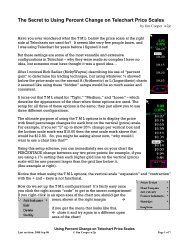The New York Times Magazine, Sunday, August 22 - Unauthorized ...
The New York Times Magazine, Sunday, August 22 - Unauthorized ...
The New York Times Magazine, Sunday, August 22 - Unauthorized ...
You also want an ePaper? Increase the reach of your titles
YUMPU automatically turns print PDFs into web optimized ePapers that Google loves.
<strong>The</strong> Bully in the Mirror<br />
camp or the beach and having to appear in public without a shirt.<br />
fter Alexander finished his workout that hot July day, we stopped to get<br />
something to drink at the gym's cafe. "I feel pretty good right now,"<br />
Alexander admitted, "and I was furious when I went in there." It turned out<br />
that the night before, he had a conversation with a girl that took a decidedly<br />
unsatisfying turn at the end.<br />
At a time when the collective amount of American body fat is enough to stretch<br />
the jaws of Skip Pope's calipers from coast to coast, when so many adults amble<br />
about like fatted calves and so many children are little more than couch potatoes<br />
in training, it's hard to find fault with disciplined, drug-free efforts by teen-age<br />
boys to add a bit of muscle; weight lifting is not a sport with shortcuts, and it has<br />
become an essential adjunct to contemporary athletic performance. But there is a<br />
psychological side to all this heavy lifting that may be as unhealthy and<br />
undermining on the inside as it seems fit on the outside. And it resides not in that<br />
telltale mirror, but in how we see ourselves.<br />
"I look in the mirror and I don't see what other people see," Alexander told me.<br />
"I look in the mirror, and I see my flaws. People go, 'Oh, you're narcissistic.' I<br />
go, 'No, I was looking at how uneven my pecs are,' although I know that in<br />
reality, they're, like, a nanometer off. And I have three friends who do exactly<br />
the same thing. <strong>The</strong>y look and they go, 'Look how uneven I am, man!' And I go:<br />
'What are you talking about! <strong>The</strong>y look pretty even to me.' It's not narcissism -it's<br />
lack of self-esteem."<br />
I'm not so worried about kids like Alexander -- he clearly has demonstrated both<br />
the discipline to remake his appearance and the psychological distance not to<br />
take it, or himself, too seriously. But there will be many other boys out there who<br />
cannot hope to match the impossibly raised bar of idealized male body image<br />
without resorting to the physically corrosive effects of steroids or the<br />
psychologically corrosive effects of self-doubt. Either way, the majority of boys<br />
will be diminished by chasing after the golden few.<br />
Moreover, this male preoccupation with appearance seems to herald a dubious,<br />
regressive form of equality -- now boys can become as psychologically and<br />
physically debilitated by body-image concerns as girls have been for decades.<br />
After all, this vast expenditure of teen-age male energy, both psychic and kinetic,<br />
is based on the premise that members of the opposite sex are attracted to a retro,<br />
rough-hewn, muscular look, and it's a premise that psychologists who study boys<br />
have noticed, too. "While girls and women say one thing, some of them continue<br />
to do another," Pollack says. "Some of them are still intrigued by the old male<br />
images, and are attracted to them."<br />
http://www.nytimes.com/library/magazine/home/199908<strong>22</strong>mag-boys-self-image.html (17 of 18) [8/<strong>22</strong>/1999 9:17:23 PM]






